
Stonehenge is a prehistoric megalithic structure on Salisbury Plain in Wiltshire, England, two miles (3 km) west of Amesbury. It consists of an outer ring of vertical sarsen standing stones, each around 13 feet (4.0 m) high, seven feet (2.1 m) wide, and weighing around 25 tons, topped by connecting horizontal lintel stones. Inside is a ring of smaller bluestones. Inside these are free-standing trilithons, two bulkier vertical sarsens joined by one lintel. The whole monument, now ruinous, is aligned towards the sunrise on the summer solstice and sunset on the winter solstice. The stones are set within earthworks in the middle of the densest complex of Neolithic and Bronze Age monuments in England, including several hundred tumuli.
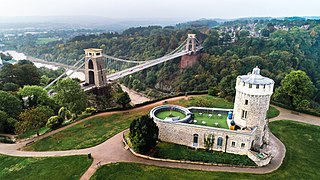
Bristol is a city, unitary authority area and ceremonial county in South West England, the most populous city in the region. Built around the River Avon, it is bordered by the ceremonial counties of Gloucestershire to the north and Somerset to the south. The county is in the West of England combined authority area, which includes the Greater Bristol area and nearby places such as Bath.

Stephen and Timothy Quay are American identical twin brothers and stop-motion animators who are better known as the Brothers Quay or Quay Brothers. They received the 1998 Drama Desk Award for Outstanding Set Design for their work on the play The Chairs.
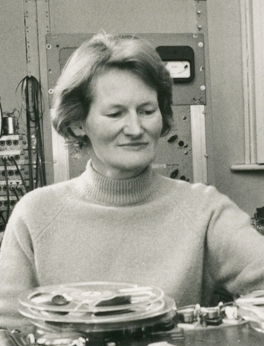
Daphne Blake Oram was a British composer and electronic musician. She was one of the first British composers to produce electronic sound, and was an early practitioner of musique concrète in the UK. As a co-founder of the BBC Radiophonic Workshop, she was central to the development of British electronic music. Her uncredited scoring work on the 1961 film The Innocents helped to pioneer the electronic soundtrack.

Bluestone is a cultural or commercial name for a number of dimension or building stone varieties, including:

Robert Lucas Pearsall was an English composer mainly of vocal music, including an elaborate setting of "In dulci jubilo" and the richly harmonic part song Lay a garland of 1840, both still often performed today. He spent the last 31 years of his life abroad, at first in Germany, then at a castle he bought in Switzerland.
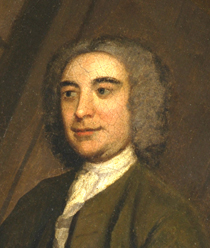
John Wood, the Elder was an English architect, working mainly in Bath.
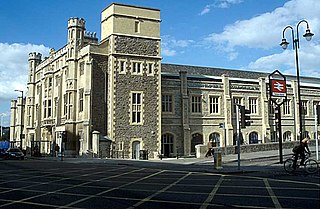
The British Empire and Commonwealth Museum was a museum in Bristol, England, exploring the history of the British Empire and the effect of British colonial rule on the rest of the world. The museum opened in 2002 and entered voluntary liquidation in 2013.
Archaeoacoustics is a sub-field of archaeology and acoustics which studies the relationship between people and sound throughout history. It is an interdisciplinary field with methodological contributions from acoustics, archaeology, and computer simulation, and is broadly related to topics within cultural anthropology such as experimental archaeology and ethnomusicology. Since many cultures have sonic components, applying acoustical methods to the study of archaeological sites and artifacts may reveal new information on the civilizations examined.
Frank Merrick CBE (1886–1981) was an English pianist and composer in the early 20th century.

Alice May Roberts is an English academic, TV presenter and author. Since 2012 she has been Professor of Public Engagement in Science at the University of Birmingham. She was president of the charity Humanists UK between January 2019 and May 2022. She is now a vice president of the organisation.

Stonehenge has been the subject of many theories about its origin, ranging from the academic worlds of archaeology to explanations from mythology and the paranormal.
The Stonehenge Riverside Project was a major Arts and Humanities Research Council-funded archaeological research study of the development of the Stonehenge landscape in Neolithic and Bronze Age Britain. In particular, the project examined the relationship between the Stones and surrounding monuments and features, including the River Avon, Durrington Walls, the Cursus, the Avenue, Woodhenge, burial mounds, and nearby standing stones. The project involved a substantial amount of fieldwork and ran from 2003 to 2009. It found that Stonehenge was built 500 years earlier than previously thought. The monument is believed to have been built to unify the peoples of Britain. It also found a previously unknown stone circle, Bluestonehenge.
Andrew Ford is an English-born Australian composer, writer, and radio presenter, known for The Music Show on ABC Radio National.
Ann Valentine was an English organist and composer, part of a talented family of Leicester musicians.
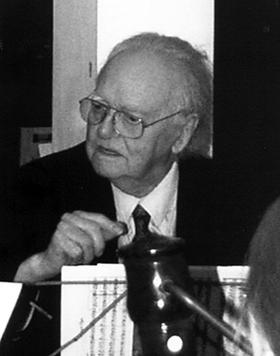
Edgar Hubert Hunt was a British musician and musicologist. He was a key figure in the early music revival in Britain in general, and in the revival of the recorder in particular. He was a founding member of the Society of Recorder Players, of which he was musical director for more than fifty years, and of the Galpin Society, of which he was later president. He was head of the early music department at Trinity College of Music, which was the first conservatory in the world to introduce a diploma in recorder.
Stephen David Banfield is a musicologist, music historian and retired academic. He was Elgar Professor of Music at the University of Birmingham from 1992 to 2003, and then Stanley Hugh Badock Professor of Music at the University of Bristol from 2003 to his retirement at the end of 2012; he has since been an emeritus professor at Bristol.

Peter G. Stone, is a British heritage professional and academic, who is the current UNESCO Chair in Cultural Property Protection and Peace at Newcastle University. He was the vice-president of Blue Shield International from 2017 to 2020, and was elected its president at the 2020 General Assembly. He is also a founding member and the chair of the UK Committee of that organisation.











